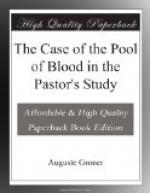The magistrate and his companion turned towards the door of the room but the doctor motioned them to come back. “I see you do not know the house as well as I do,” he said, and led the way towards a niche in the side of the wall, which was partially filled by a high bookcase.
“Ah—that is the entrance of the passage to the church?” asked the magistrate in surprise.
“Yes, this is it. The door is not locked.”
“You mean you believe—”
“That the murderers came in from the church? Why not? It is quite possible.”
“To think of such a thing!” exclaimed the notary with a shake of his head.
The doctor laughed bitterly. “To those who are planning a murder, a church is no more than any other place. There is a bolt here as you see. I will close this bolt now. Then we can leave the room knowing that no one can enter it without being seen.”
The simple furniture of the study, a desk, a sofa, a couple of chairs and several bookcases, gave no chance of any hiding place either for the body of the victim or for the murderers. When the men left the room the magistrate locked the door and put the key in his own pocket. The gendarme in the neighbouring apartment was sent down to stand in the courtyard at the entrance to the house. The sexton, a little hunchback, was ordered to remain in the vestry at the other end of the passage from the church to the house.
Then the thorough search of the house began. Every room in both stories, every corner of the attic and the cellar, was looked over thoroughly. The stable, the barns, the garden and even the well underwent a close examination. There was no trace of a body anywhere, not even a trail of blood, nothing which would give the slightest clue as to how the murderers had entered, how they had fled, or what they had done with their victim.
The great gate of the courtyard was closed. The men, reinforced by the farm hands, entered the church, while Liska and the dairy-maids huddled in the servants’ dining-room in a trembling group around the old housekeeper. The search in the church as well as in the vestry was equally in vain. There was no trace to be found there any more than in the house.
Meanwhile, during these hours of anxious seeking, the rumour of another terrible crime had spread through the village, and a crowd that grew from minute to minute gathered in front of the closed gates to the rectory, in front of the church, the closed doors of which did not open although it was a high feast day. The utter silence from the steeple, where the bells hung mute, added to the spreading terror. Finally the doctor came out from the rectory, accompanied by the magistrate, and announced to the waiting villagers that their venerable pastor had disappeared under circumstances which left no doubt that he had met his death at the hand of a murderer. The peasants listened in shuddering silence, the men pale-faced, the women sobbing aloud with frightened children hanging to their skirts. Then at the magistrate’s order, the crowd dispersed slowly, going to their homes, while a messenger set off to the near-by county seat.




